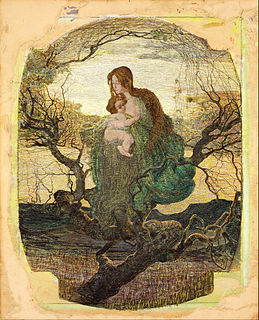In heraldry, sable is the tincture black, and belongs to the class of dark tinctures, called "colours". In engravings and line drawings, it is sometimes depicted as a region of crossed horizontal and vertical lines, or else marked with sa. as an abbreviation.
The Divalia was a Roman festival held on December 21, in honour of the goddess Angerona, whence it is also called Angeronalia. On the day of this festival the pontifices performed sacrifices in the temple of Voluptia, or the goddess of joy and pleasure, who, some say, was the same with Angerona, and supposed to drive away all the sorrow and chagrin of life.

An antechamber is a smaller room or vestibule serving as an entryway into a larger one. The word is formed of the Latin ante camera, meaning "room before". "Antechamber" comes from the French antichambre.
Agonoclita or the Agonoclites in antiquity was a Christian sect from the 7th century whose distinguishing principle was never to kneel, but to deliver all their prayers standing.
Angelica (Ἀγγελική) was a celebrated dance among the ancient Greeks, performed at their feasts. It was thus called from the Greek ἄγγελος, by reason, as Pollux assures us, the dancers were dressed in the habit of messengers.
Antepredicaments, in logic, are certain previous matters requisite to a more easy and clear apprehension of the doctrine of predicaments or categories. Such are definitions of common terms, as equivocals, univocals, etc., with divisions of things, their differences, etc. They are thus called because Aristotle treated them before the predicaments, hoping that the thread of discourse might not afterwards be interrupted.
Apertura tabularum, in ancient law books, signifies the breaking open of a last will and testament.
Argentum album, mentioned in Domesday, signifies bullion, or silver uncoined. In those ancient days, such passed as money from one to another in payment.
Arrestando ipsum qui pecuniam recepit is a writ for the arrest of someone who received advanced payment to enlist in the army, and then fled.
The Arrhabonarii were a Polish Christian sect who held that the Eucharist was either the real flesh or blood of Jesus Christ as is believed by mainstream Catholics. Instead, the Arrhabonarii believed the Eucharist was a pledge of a gift to be bestowed in heaven. The sect's name is derived from the Greek Ἀρραβων, Arrha, meaning "earnest". The position was first argued by Francesco Stancaro in 1543.
The Astati were a Paulician sect in the 9th century, the followers of Sergius, who renewed the beliefs of Manichaeism. They prevailed much under Emperor Nicephorus I, but later, under Michael I Rhangabes, they were curbed with very severe laws.
In heraldry, an avellane cross is a form of cross which resembles four hazel filberts in their husks or cases, joined together at the great end. The term comes from the Latin name for the hazel, originally Nux avellana. It was fairly rare in English heraldry.

Mosaic gold or bronze powder refers to tin(IV) sulfide as used as a pigment in bronzing and gilding wood and metal work. It is obtained as a yellow scaly crystalline powder. The alchemists referred to it as aurum musivum, or aurum mosaicum. The term mosaic gold has also been used to refer to ormolu and to cut shapes of gold leaf, some darkened for contrast, arranged as a mosaic. The term bronze powder may also refer to powdered bronze alloy.
Azones in mythology, was a term anciently applied to gods and goddesses that were not the private divinities of any particular country or people. They were acknowledged as deities in every country, and worshipped in every nation. The word is etymologically derived from Greek for "without" and "country". The azones were to a degree above the visible and sensible deities, which were called zonei, who inhabited some particular part of the world, and never stirred out of the district or zone that was assigned them.
In Aristotelian logic, baroco is a mnemonic word used to memorize a syllogism. Specifically, it has the first proposition universal and affirmative, but the second and third particular and negative, and the middle term the attribute in the two first. For example,

In heraldry, cabossed, or caboched, is a term used where the head of a beast is cut off behind the ears, by a section parallel to the face; or by a perpendicular section: in contrast to couping, which is done by a horizontal line, and farther from the ears than cabossing.

Cercelée, or Sarcelly, is a term in heraldry. A cross cercelée is like an exaggerated cross moline, and to a lesser extent similar to the anchored cross, with its forked tips curving around both ways, like a ram's horns. The form is also known as recercelée, for example by Boutell.

In architecture and joinery, the chambranle is the border, frame, or ornament, made of stone or wood, that is a component of the three sides round chamber doors, large windows, and chimneys.







